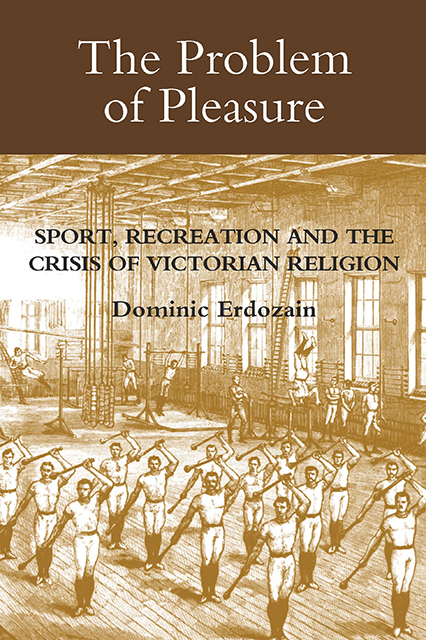Book contents
- Frontmatter
- Contents
- List of Illustrations
- Acknowledgements
- Abbreviations and Note on Conventions
- Introduction
- 1 ‘Born Free and Everywhere in Chains’: Evangelicalism and the Problem of Pleasure
- 2 Romanticism With Boots on: The Virtues of Sport
- 3 Renegotiating the Secular: The Coming of Recreation to the Mid-Victorian Religious World
- 4 ‘We are all Cyclists Now’: Applying the Pleasure Principle
- 5 Sport and the Secularisation of Late-Victorian Youth Ministry
- 6 Contesting the Sacred: The Late-Victorian Church and the ‘Gospel of Amusement’
- Conclusion
- Bibliography
- Index
Conclusion
Published online by Cambridge University Press: 02 March 2023
- Frontmatter
- Contents
- List of Illustrations
- Acknowledgements
- Abbreviations and Note on Conventions
- Introduction
- 1 ‘Born Free and Everywhere in Chains’: Evangelicalism and the Problem of Pleasure
- 2 Romanticism With Boots on: The Virtues of Sport
- 3 Renegotiating the Secular: The Coming of Recreation to the Mid-Victorian Religious World
- 4 ‘We are all Cyclists Now’: Applying the Pleasure Principle
- 5 Sport and the Secularisation of Late-Victorian Youth Ministry
- 6 Contesting the Sacred: The Late-Victorian Church and the ‘Gospel of Amusement’
- Conclusion
- Bibliography
- Index
Summary
Historical events, upon close analysis, almost always lose their simplicity and explode into multiplicity. A street murder in the headlines becomes a macabre conspiracy. A third-rate burglary exposes a complex network of political malfeasance that brings a national administration to its fall. But the inverse is also true. The slow transformation of a civilization, viewed from a great distance, becomes a single event. Classical civilization ‘declines’ for a millennium and a half – from Caesar's coup d’etat to the Ottoman conquest of Constantinople – but historians yet speak of the Fall of Rome. In the same manner the four-hundred-year story of an ideological tradition can be apprehended as a unitary event. It is not only from a divine perspective that a thousand years are as the twinkling of an eye. (Sydney E. Ahlstrom)
Ahlstrom's sweeping vision, from a volume on ‘Continuity and Discontinuity in Church History’, strikes a refreshing contrast to the dissident particularity that currently dominates the profession. If, as another American scholar, Arthur Schlesinger Jr., once suggested, ‘Written history ⦠is the application of an aesthetic vision to a welter of facts’,2 we need more arresting landscapes and fewer vignettes. Statements such as ‘no ideas but in things’ and ‘God is in the details’3 have become the badges of a defiant empiricism, delighting in the dissonance of facts, but they can leave you cold. We are so enamoured of the ‘pastness of the past’ – ‘a foreign country’, where things are done ‘differently’ – we forget that it is a country contiguous to our own, and it should challenge our isolation. Ahlstrom's suggestion that, even as we trace the decline of a tradition, ‘Historical reflection may lead us to valuable resources within the tradition itself’, provides a timely corrective to a profession reared on Herbert Butterfield's ‘animadversions’ on the so-called ‘Whig Interpretation’ of history.4 The chief aim of the historian, Butterfield argued, is ‘the elucidation of the unlikenesses between past and present’5. History is not a prelude to the present, let alone a homage. Peter Burke has developed the theme, characterising historians as ‘the guardians of awkward facts, the skeletons in the cupboard of the social memory’.
This noble vision becomes a burden, however, when it assumes that the past cannot inform the present,7 that synthesis and comparison are always suspect, and when ‘nuance’ is regarded as the highest virtue of historical writing.
- Type
- Chapter
- Information
- The Problem of PleasureSport, Recreation and the Crisis of Victorian Religion, pp. 271 - 282Publisher: Boydell & BrewerPrint publication year: 2010



